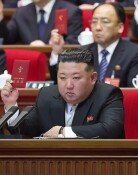[Editorial] Earning Trust With Policies That Work
[Editorial] Earning Trust With Policies That Work
Posted January. 20, 2009 08:08,
President Lee Myung-baks new economic team consists of Strategy and Finance Minister-designate Yoon Jeung-hyun, senior presidential secretary Yoon Jin-shik and Financial Services Commission Chairman-designate Chin Dong-soo. They must tackle the monumental challenge of saving the economy and improve the worsening livelihood of the people.
The success of the new economic team primarily depends on whether it can earn the trust of all economic players at both home and abroad, not of the president. Faith in the team will grow only when its actions prove stronger than words. In other words, its policy, policy tools and the ability to manage the market must bring substantive results. The empty rhetoric of the previous team will no longer work, such as ruling out a financial crisis or a pledge to create 900,000 jobs. The new team can restore market confidence only when it lowers foreign exchange rate volatility and the unemployment rate. Therefore, it must be held directly responsible for the effects its policies have on the market.
Though the financial market has taken a turn for the better compared to the previous quarter, when rumors of crisis were prevalent, it is still on thin ice. With the market feeling the full extent of the downturn in the real economy, many even fear negative economic growth this year. Furthermore, the specter of mass unemployment is beginning to haunt the market, with the number of jobs falling 12,000 year-on-year last month, the first drop in employment in more than five years.
In addition, restructuring in construction and shipbuilding industries has lost momentum after the task was left to the financial sector. The new economic team must promptly take the lead to ensure that excess liquidity goes to those in need. Sending the wrong policy signal that the government will save all troubled companies will only hamper restructuring efforts. If insolvent companies are not promptly liquidated, it might bring about the contrary effect of labeling all companies insolvent.
The team must share its policy direction and priorities with the market. Only then can it send a clear and consistent message to economic players. It will do well to learn from the failure of its predecessor, which tried in vain to implement the so-called growth-oriented 747 strategy together with measures to tackle the economic crisis in an irreconcilable manner. More importantly, the previous team failed in teamwork, so the new team must address such cacophony and listen more attentively to market participants and economic players to quell worry over unbalanced policy implementation. A policy that goes well with the market is possible only when policymakers pay close attention to its needs.
At the same time, the president and ministers alike must be more careful with their words. They must keep in mind the critical responses to their comments on the stock market or fund investment last year, which can only be deemed as inappropriate. It is equally important to refrain from making casual comments on the foreign exchange or interest rates or any individual company. Careless comments by top economic officials could clash with policy direction or market expectation, which in turn may erode the governments credibility.
It is up to the president to create an environment where the new economic team can do its job right.







